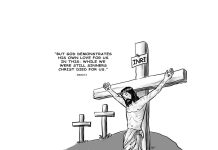THE Sustainable Rice Platform (SRP) is a global initiative to ensure the continuing supply of rice worldwide forever, so to speak.
What is unique about the platform is that they are purposely bringing together all the players in the rice supply chain, meaning to say not only the producers and the consumers, but also the researchers, the traders and the advocates of this particular cause.
As I see it, this is the way how it should be done, this way of doing it through the supply chain approach, and coupling it with a holistic framework. Having liked this approach and framework so much, I decided to create a pneumonic device for it. The device is an acronym for consumers, organizations, producers, policy makers, entrepreneurs, researchers and societies (COPPERS).
To some extent, I actually took some poetic license in creating the pneumonic device, because “organizations” would mean non-government organizations (NGOs), entrepreneurs would mean businessmen in general and traders in particular, and societies would mean “civil society”, inclusive of all advocates and activists, so to speak.
There might be some redundancies here because many NGOs are also civil society players, but never mind that, because it is better to have all bases covered. What is important here is that all players are included, meaning to say that no one is left out. By the way, for purposes of this pneumonic device, “policy makers” would include both the Legislative Branch and the Executive Branch.
Don’t get me wrong, because as I see it, the COPPERS device could also be used for all aspects of human life in general, and for all aspects of good governance in particular, meaning to say that it is not just for rice sustainability. What is important to note here is that governance is a two-sided process that should include not only the structured government, but also the governed, the people who are represented by the civil society.
As simple as it sounds, it should be made clear that the basic premise here is that both sides of the governance equation are talking to each other, in other words they are coordinating and communicating. In much simpler terms, that should mean that they are always meeting, either online or in person.
In a manner of speaking, it could be said that the people who are using social networking sites and mobile apps are actually always meeting with each other, either via chat, video conferences, instant messaging, net meetings or whatever you might want to call it.
For all intents and purposes, it could be said that what used to be called “teleconferences” could now also be done via online and mobile means, in means that are better and cheaper, perhaps even faster. In other words, to cut a long story short, several online and mobile means are now available for the government and the people to virtually meet either jointly or severally, the latter should be interpreted to mean one side meeting on their own.
Believe it or not, there are existing mechanisms where the government and the people could meet in person, and these mechanisms are even backed up by the law. Among others, the Regional Development Councils (RDCs) are supposed to be meeting regularly, as provided for in the Local Government Code (LGC).
As it is supposed to be, all the regional directors are supposed to be attending the RDC meetings, but they are apparently not coordinating and communicating with each other about what they should discuss in those meetings. As a remedy to that shortcoming, I propose the creation of the Alliance of Coordinating Councils for Organized Regional Development (ACCORD).
As implied in the name, all regional directors should create their own coordinating councils for their own areas of concern, before they move up to the ACCORD level.
ACCORD should be good enough for the coordination of the government at the regional level, but aside from that, we also need coordination among the people at the regional level. Towards that end, I propose the creation of the Federation of Citizens and Leaders (FOCAL). This could be used as the forum for bringing together the agendas of all NGOs and Civil Society Organizations (CSOs) at the regional level.
As provided for in the LGC however, the RDC is supposed to be the apex of lower development councils at the barangay and municipal levels. It goes without saying therefore that both ACCORD and FOCAL should also have people at the local levels. As it is supposed to be, all the actions of the RDCs should be coordinated by the National Economic Development Authority (NEDA).
For whatever it is worth, it could be said that both ACCORD and FOCAL could conduct their meetings via online and mobile means. First of all however, they should know each other and more important than that, they should be able to contact each other. In this connection, CCS, a global company based in Singapore but with offices in the Philippines has offered the free use of PHILGOV, an online and mobile directory of Philippine government officials all the way down to the regional level.
Aside from that, CCS has also offered the free use of WECARD, an electronic substitute for paper calling cards. The technology uses the Quick Response (QR) could that is already a standard feature in all smartphones. By putting PHILGOV and WECARD together, these is no more excuse that government officials could not know each other and contact each other. (iseneres@yahoo.com/PN)







